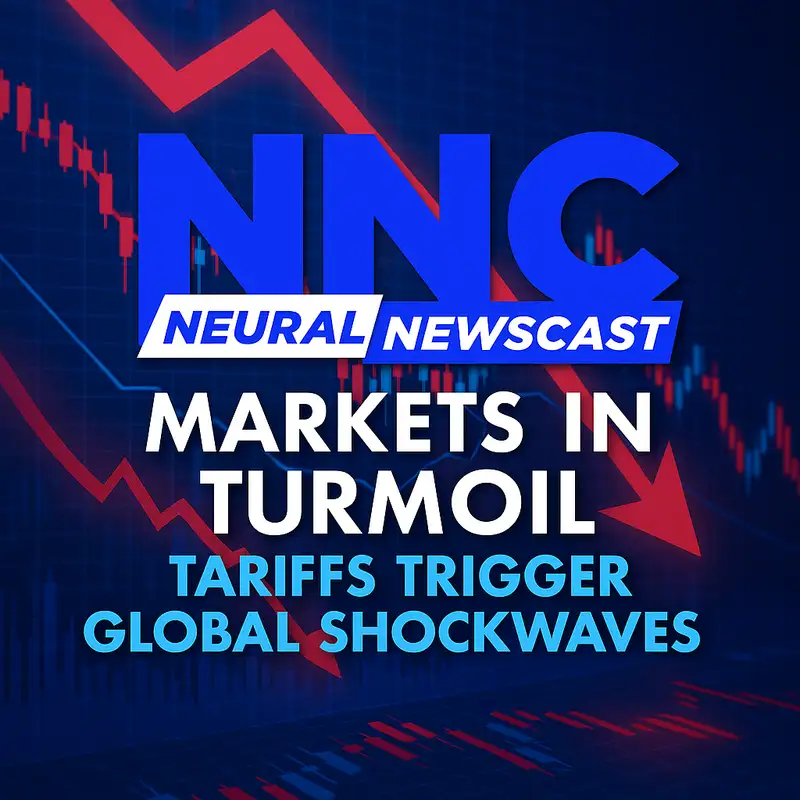Global Markets in Turmoil: Analyzing Trump's Tariff Impact
[00:00] Ethan Wells: Welcome to this special bonus episode of PLACEHOLDER 0 . Today, we're diving into the tumultuous world of global markets, shaken by recent tariff announcements from President Donald Trump. We'll be exploring the impact of these tariffs from various perspectives. Let's start with an article from Yahoo Finance. [00:18] Ethan Wells: The article titled "Stock market today: S P 500, Nasdaq plunge, Dow drops 1, 500 points as Trump's tariffs rip through markets worldwide" reports a significant downturn in the stock market. According to finance. yahoo. com, the S P 500 and Nasdaq experienced sharp declines, while the Dow Jones Industrial Average fell by a staggering 1, 500 points. This reaction was immediate and widespread, affecting markets globally due to the uncertainty introduced by these new tariffs. [00:46] Ethan Wells: The article highlights that these tariffs are not just a domestic issue but have ripple effects across international markets. Investors are reacting to the potential for increased costs and disrupted supply chains, which could lead to higher prices for consumers and reduced corporate profits. This situation underscores the interconnectedness of global economies and how policy decisions in one country can have far-reaching consequences. [01:12] Ethan Wells: Moving on to our next source, NBC News provides further insight into the immediate impact of these tariffs on U. S. stocks. The article "U. S. stocks plunge minutes into trading day as tariffs slam global markets" details how stocks plummeted at the opening bell following Trump's announcement. [01:30] Ethan Wells: According to nbcnews, the S P 500 dropped more than 4 , the Dow Jones Industrial Average fell by 3. 7 or 1, 700 points, and the Nasdaq saw a nearly 5 decline. These swings resulted in trillions of dollars in value being wiped out within minutes of trading. Retail stocks were particularly hard hit, with companies like Lululemon, Nike, and Ralph Lauren experiencing double-digit percentage drops. [01:55] Ethan Wells: Small businesses are expected to feel the brunt of these tariffs as well. The Russell 2000 index, which tracks small-cap companies, is anticipated to suffer significant losses due to increased costs and reduced consumer spending power. This paints a grim picture for many sectors of the economy as they navigate these new economic challenges. [02:17] Ethan Wells: NPR offers another perspective on this unfolding situation with their article titled "U. S. stocks tumble on trade war fears over new tariffs. " According to www. npr. org, fears of a looming trade war are driving down stock prices as investors grapple with uncertainty. [02:33] Ethan Wells: The NPR piece emphasizes that these tariffs are stoking fears of retaliatory measures from other countries, potentially escalating into a full-blown trade war. Such a scenario could further destabilize global markets and disrupt international trade relations. Investors are clearly concerned about the long-term implications of these policies on economic growth and stability. [02:54] Ethan Wells: The article also touches on how different sectors might be affected differently by these tariffs. While some industries may benefit from protectionist measures, others could face severe challenges due to increased costs and reduced access to foreign markets. This complex interplay is what investors are trying to navigate amidst this uncertainty. [03:14] Ethan Wells: Finally, let's turn our attention to China's response as reported by The Guardian in their article "China condemns unilateral bullying as it calls on US to drop tariffs. " According to www. theguardian. com, China has strongly criticized what it perceives as unilateral actions by the U. S. , labeling them as 'bullying. ' [03:34] Ethan Wells: The Guardian reports that China is calling for the U. S. to reconsider its tariff strategy and engage in dialogue rather than imposing unilateral measures. This stance reflects China's position that such actions not only harm bilateral relations but also threaten global economic stability. [03:51] Ethan Wells: The article also highlights that China is preparing for potential retaliatory measures if the U. S. does not back down from its tariff plans. This escalation could lead to further market volatility and economic tension between two of the world's largest economies. It remains to be seen how this situation will unfold in the coming weeks. [04:13] Ethan Wells: That concludes our discussion on today's episode of PLACEHOLDER 0 regarding Trump's tariffs and their impact on global markets. Thank you for joining us, and stay tuned for more updates on this developing story.
Creators and Guests



